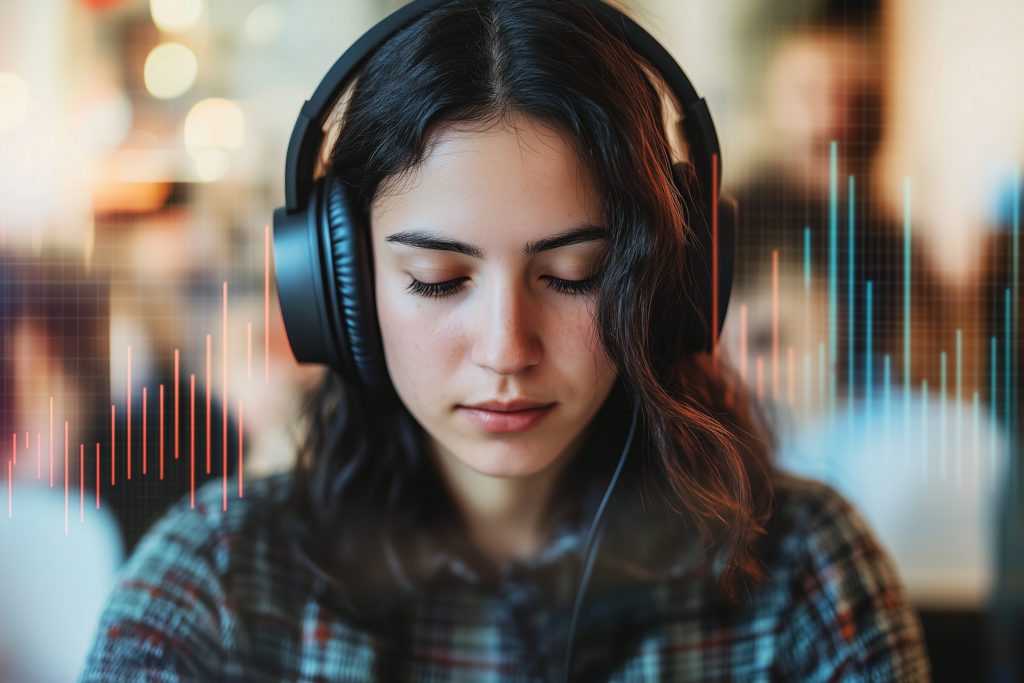
Studying With Binaural Beats: Can They Improve Your Focus and Concentration?
Learn how binaural beats may improve focus and concentration to help you study.

Have you ever heard a song that changed your life? Binaural beats are "music" that may be able to help you change your life by improving focus and concentration. In this mile-a-minute world filled with distractions, simply sitting down to study can feel like a feat. Millions of things are vying for our attention every single second of the day. Stress, racing thoughts, and a habit of procrastination can all conspire to sabotage our well-intentioned efforts of saddling in to get some work done. However, there may be a hack that allows us to plug into productivity and creativity by simply plugging in some headphones. This article will explore how binaural beats may help with studying.
What Are Binaural Beats?
While it may seem odd, binaural beats are considered "auditory illusions." Binaural beats happen when we hear two different tones in each ear. When beats differ slightly in frequency, the brain processes a new beat at the difference of the frequencies. Our brains essentially fill in the gaps to fall into synchrony with the difference. That means that you'll hear a new tone that accompanies the two tones in each ear.
How Do Binaural Beats Help With Focus?
It turns out that binaural beats may induce the same mental state that we get from intense meditation. Listening to binaural beats can get us in a meditative state without the actual work of meditating. That leaves us free to be productive instead of getting into a relaxed, trance-like state. For many people, listening to binaural beats induces the mediative benefits of:
- Reduced anxiety
- Reduced stress
- Increased relaxation
- Positive mood and optimism
Of course, the most important meditative benefit for someone who struggles with academic stress might be the calming of the mind that allows them to tune out the many random and distracting thoughts that pop up! The last key point to know about binaural beats is that they are measured in hertz (Hz). While binaural beats with higher Hz wavelengths are associated with cognition and productivity, lower Hz wavelengths are associated with rest and relaxation.
How Binaural Beats Improve Concentration
Researchers believe that low-frequency binaural beats are associated with mental relaxation. Meanwhile, high-frequency beats might facilitate attentional control in a way that improves attentional efficiency in the frontal cortex.
The reason why binaural beats affect our brains has to do with a portion of the brain called the superior olivary complex. Found in the brain stem, the superior olivary complex can be thought of as the entryway within the brain that processes sound input from both ears. One of its jobs is to synchronize neuron activity in the brain. When two close frequencies are heard when listening to a binaural beat, a change in brain waves is activated. Many researchers believe that listening to some binaural beats can boost the performance of some brain waves by either promoting or suppressing various brain functions associated with emotions and thought.
Does that mean that listening to binaural beats is the secret to acing all of your exams? Not exactly. While plenty of people have been using binaural beats with success, research is still emerging on the effectiveness of what researchers call "brainwave entertainment" for boosting cognitive performance.
Tips for Using Binaural Beats to Enhance Studying
If you're planning to use binaural beats for the first time to boost focus and concentration during a study practice, there are some best practices to know about.
- First, always make sure that you're listening to sounds at a safe volume - Tracks of 8Hz to 12Hz should be listened to at a low volume to help your brain slowly drift into something called an alpha focus state.
- Headphones are ideal - They can drown out ambient noise that can distract you.
- Listen to binaural beats sparingly - Finally, reserve the "binaural beat hack" for serious studying crunch times when you need a jolt of focus.
Can Binaural Beats Provide Other Benefits?
People aren't just using binaural beats to get into focused states for studying. It turns out that binaural beats may be helpful for sleep too. A 2018 study found that a 3-Hz binaural beat on a 250-Hz carrier tone can be used to modulate sleep stages by decreasing duration of N2 non-rapid eye movement (NREM) sleep while also increasing duration of the N-3 slow-wave sleep that is the "deep and final" stage of non-rapid eye movement (NREM) without sleep disturbance and sleep fragmentation.
A 2022 study looking at the effect of auditory stimulation using delta binaural beats for better sleep and post-sleep mood found that auditory stimulation with delta binaural beats enhanced sleep parameters related to sleep failure, the number of awakenings, duration, sleep quality, and feeling upon waking. As a result, researchers labeled auditory stimulation with a delta binaural beat as a potential low-cost alternative to medication and other treatment methods.
Roadmap To Using Binaural Beats
It turns out that different wave frequencies can influence different parts of the brain. You’ll want to choose binaural beats in the correct range based on your desired state. Here's a little road map:
- Delta (1 to 4 Hz): Used for deep sleep, relief, mediation, and cortisol reduction.
- Theta (4 to 8 Hz): Used for mediation and deep relaxation.
- Alpha (8 to 14 Hz): Used for relaxation, focus, stress reduction, and expanded learning capabilities.
- Beta (14 to 30 Hz): Used for focus, analytical thinking, problem-solving abilities, and deep cognition.
- Gamma (30 to 100 Hz): Used for memory recall, cognition, attention to detail, and creativity.
Ready to Power Up Your Study Sessions?
Anyone who is on a mission to improve focus and sleep quality in order to improve studying is likely to be interested in the growing research on the health benefits of binaural beats. Of course, studying your own sleep habits can be the first step to making sure you're always studying with a perfectly rested brain. That's why the smartest sleepers use Pillow to get insights about their personal sleep health! Pillow lets you track sleep duration with a scientifically backed sleep analysis that comes with audio recordings and heart-rate analysis.

Written by
Emily Mendez
Emily Mendez is a former therapist and mental health author. She is one of the leading voices in mental health. Emily's writing has appeared in eCounseling, SonderMind, and more. Emily is frequently interviewed by Healthline, Fatherly, INSIDER, Family Circle, and other national media for her advice and expert opinion on the latest mental health topics.
Download Pillow
Get help
Press & News
Legal
Connect
X (Twitter)
Company
Copyright © Neybox Digital Ltd.



